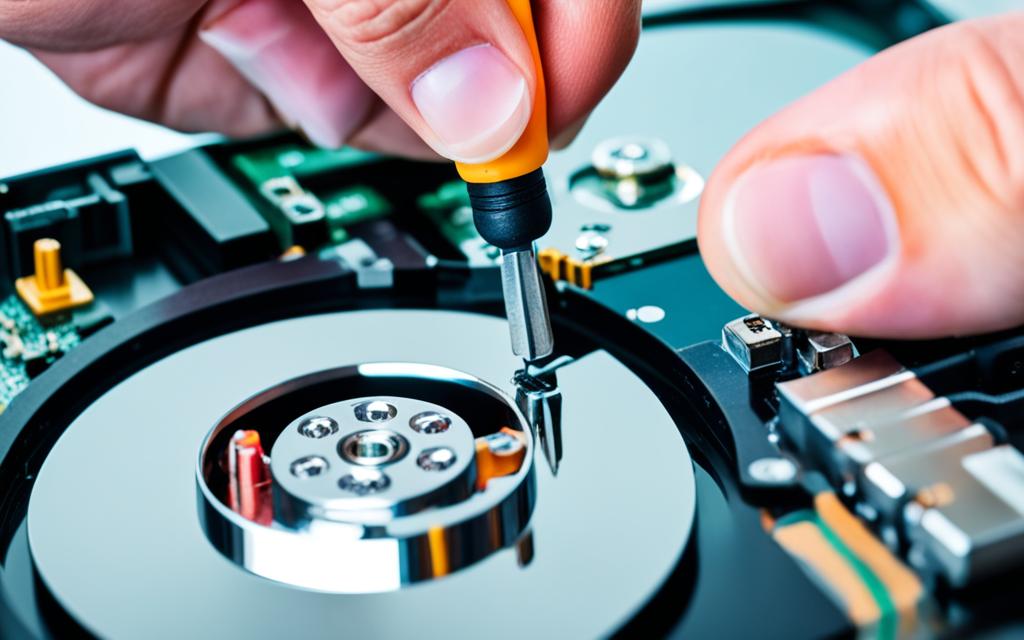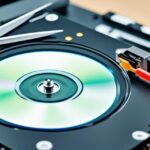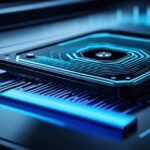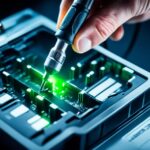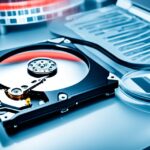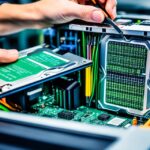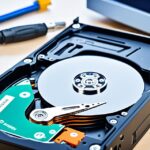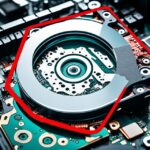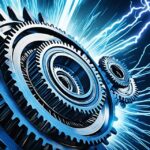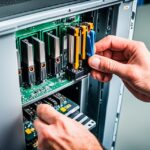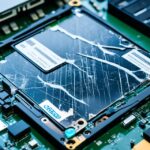Table of Contents
When your hard drive makes clicking noises, it’s often a bad sign. This can mean there’s a serious problem that could lead to losing your data. It’s critical to know how to fix a clicking HDD. This knowledge helps keep your data safe and your device working well. Many find ways to deal with hard drive clicking by spotting early signs, figuring out why it’s happening, and fixing it quickly. Even though the clicking noise may worry you, staying calm and knowing what to do is key to saving your data before it’s too late.
We wrote this article to show you how to fix clicking hard drive problems. These steps and tips should make you feel more confident about your storage devices. Clicking noises are common warnings for hard drive failure—70% of them show signs like this before they entirely fail. So, it’s very important to deal with these issues right away1. By learning from this, you’ll be able to handle any clicking hard drive problems and also stop them from happening again in the future. This means your important data stays protected.
Key Takeaways
- Identify symptoms of clicking HDDs early to prevent catastrophic data loss.
- Data recovery services can significantly aid in salvaging data from clicking drives.
- Regular maintenance extends the average lifecycle of your hard drive, typically 3-4 years.
- Understanding common causes behind clicking sounds can guide timely fixes.
- Backing up data is crucial to avoid permanent loss due to hard drive failures.
Understanding the Clicking HDD Issue
A clicking hard drive signals potential data loss. Users might hear a distinct “click, click, click” sound. This noise happens at startup or when using the drive. It shows a range of problems, from small issues to big mechanical failures.
Common Symptoms of a Clicking Hard Drive
Spotting clicking hard drive symptoms early is key. You might notice:
- Persistent clicking noises
- The drive not being detected by the system
- Regular crashes or freezes
- Odd error messages when accessing data
These signs point to hard drive issues needing fast action to avoid more trouble.
What Causes a Hard Drive to Click?
The causes of HDD clicking come from different problems, including:
| Cause | Description | Average Duration |
|---|---|---|
| Clicking heads | Heads can’t access data owing to poor alignment. | 21 seconds |
| Dead heads | The read/write heads have mechanically failed. | 14 seconds |
| Torn heads | Physical harm prevents them from working right. | 20 seconds |
| Scratched platter | Surface scratches stop data from being read. | 25 seconds |
| Stuck motor | The motor fails, making the heads move wrongly. | 20 seconds |
Physical damage is a top cause of HDD clicking. It might happen from dropping the drive or too much humidity. Wear and tear also plays a big role as time goes on. It’s crucial to know these issues to fix the problem well.
These problems are complex, so getting professional help is smart. Trying DIY repairs might make things worse234.
How to Fix HDD Clicking
Fixing a clicking hard drive starts with a step-by-step method. Each phase is vital for finding the problem and preventing data loss. This helps figure out the best solution for the clicking sound.
Step 1: Recover Data from a Clicking Drive
First, try to get back any data you can access. You should use reliable data recovery methods. For drives that still work, EaseUS Data Recovery Wizard is a good choice.
Step 2: Use Data Recovery Services
If software doesn’t solve the problem, it’s time to ask experts for help. Data recovery services have the skills to save files from broken drives. They are ready for many situations, like severe damage or when drives won’t start56.
Step 3: Change the Hard Drive Connection
Connection issues can also cause problems. Make sure the hard drive cables and power supply match and connect right. Sometimes, a simple cable swap can stop the clicking sound. This step could fix the issue.
Step 4: Cool Down the Hard Drive
Heat can harm hard drives, leading to failure. If yours is too warm, cool it down. You might let it rest or use a fan. Watch for overheating signs, as they can cause clicking sounds5.
Step 5: Seek Professional Repair
In case of serious hardware issues, professional help is the best option. Repair shops can fully check the clicking drive and suggest solutions. Their advice is crucial, especially for valuable data.
Preventing Future Hard Drive Clicking Problems
To keep your hard drive healthy and reduce clicking issues, follow some maintenance tips. Ensure your drive is clean and cool to lower problem risks. Clicking sounds often mean physical damage, so handle your hard drive gently7. Also, having the right conditions inside your computer, such as enough power, helps prevent issues8.
Regular Maintenance Tips for Your HDD
Looking after your hard drive can make it last longer. Here’s what you should do:
- Keep the hard drive clean to stop dust from building up.
- Make sure it’s cool to avoid it getting too hot and failing.
- Be careful when you install or move your drives.
- Make sure the power it gets is steady so it works well.
- If data cables are broken, replace them to avoid problems9.
Importance of Backing Up Data
Backing up data is crucial. It keeps your data safe if your hard drive suddenly fails. Using cloud storage or external drives for backups is smart. It keeps your key files secure, making recovery easy if hard drive issues happen as noted. Starting good backup habits is a key step for data security and peace of mind.
The worse the hard drive problem, the harder it is to get data back. Putting effort into backups now can greatly cut down future data loss risks79.
Conclusion
Understanding the clicking noise from an HDD is vital. It often signals big problems. This guide has covered key repair and recovery steps. From trying to get your data back to asking experts for help, we’ve looked at it all. Clicking can mean physical damage or wear, so being aware helps protect your data10.
Don’t forget to regularly check your HDD and back up your files. This prevents losing important data later. While some DIY fixes might work, it’s better to be safe and follow expert advice11. If your HDD problem is big, getting help from pros can greatly help save your data.
By being proactive with HDD issues, you protect your digital world. A well-maintained hard drive works better and keeps your files safe. This way, your computing tasks run smoothly, giving you peace of mind.
FAQ
What should I do if my hard drive is clicking?
Quick action is crucial if your hard drive starts clicking. First, attempt to save your data using software like EaseUS Data Recovery Wizard. If unsuccessful, it’s wise to seek help from experts in data recovery.
What are the signs of a failing hard drive?
Look out for warning signs such as clicking noises, slow performance, crashes, and apps not working. These signs suggest your HDD might be failing. It’s important to act immediately.
Can I fix a clicking hard drive myself?
You might fix minor clicking by checking connections and cooling. However, serious issues usually mean hardware failure. In such cases, professional repair is your best option.
How can I prevent future clicking problems with my HDD?
Regular upkeep, like cleaning and cooling your HDD, helps. Also, handling it gently and backing up data are key practices. Backup is your safety net against data loss.
Is it safe to continue using a clicking hard drive?
Using a clicking hard drive risks further damage and data loss. Stop using it and start data recovery steps right away.
What types of data recovery services are available?
Data recovery experts offer both software and hardware fixes. They have the skills and tools to get back data from damaged drives.
What causes a hard drive to click?
Clicking can result from damage, wear, electrical issues, or misaligned read/write heads. Knowing the cause helps solve the problem.
How important is data backup for HDD health?
Backup is key for keeping your data safe. Use cloud or external drives for backup. This protects your files from HDD failures.
Source Links
- https://recoverit.wondershare.com/harddrive-errors/fix-clicking-hard-drive-and-recover-data.html – A Complete Guide to Fixing a Clicking Hard Drive
- https://www.securedatarecovery.com/blog/hard-drive-clicking – Hard Drive Clicking: Common Causes & Solutions
- https://www.datarecovery.net/articles/what-is-hard-drive-clicking.aspx – What is Hard Drive Clicking? Understanding Its Causes and Fixes | ACE Data Recovery Services Article
- https://www.minitool.com/data-recovery/clicking-hard-drive-recovery.html – Clicking Hard Drive Recovery Is Difficult? Absolutely No – MiniTool
- https://www.ubackup.com/data-recovery-disk/recover-data-from-clicking-hard-drive-8975.html – Recover Data from Clicking Hard Drive (2024) – Best Ways
- https://www.diskinternals.com/partition-recovery/hard-drive-clicking/ – Why the Hard Drive Making Noises and How to Fix It
- https://www.pitsdatarecovery.com/blog/clicking-hard-drive-reasons/ – Reasons for Hard Drive Clicking Sound
- https://community.wd.com/t/wd-elements-makes-some-noise-is-this-normal/273900 – WD elements makes some noise, is this normal?
- https://www.lazarusdatarecovery.com/blog/hard-drive-clicking-noise – Why is my hard drive making a clicking noise?
- https://www.easeus.com/disk-copy/clone-resource/hard-drive-making-clicking-noise-every-few-seconds.html – Hard Drive Making Clicking Noise Every Few Seconds – Why & What to Do
- https://community.spiceworks.com/t/freeze-the-hard-drive-to-fix-the-click-of-death/604782 – Freeze the hard drive to fix the click of death.

